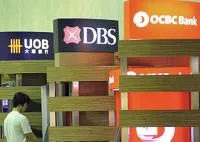
What you must know about the new Total Debt Servicing Ratio imposed by MAS on Singapore banks
It took effect from June 29.
According to Maybank Kim Eng, the Monetary Authority of Singapore has introduced a Total Debt Servicing Ratio (TDSR) framework to govern property loans granted by financial institutions (FIs) to individuals.
This standardizes what MAS felt were uneven practices in the application of debt servicing ratio and took effect from 29 June. The TDSR framework will be applied to loans for the purchase of ALL types of property, loans secured on property and refinancing of all such loans.
Here's more from Maybank:
In short, FIs will be required to take into account the monthly repayment for the property loan applied, plus the monthly repayments on all other outstanding property and non-property debt obligations of the borrower.
A specified medium-term interest rate (3.5% for residential property and 4.5% for non-residential property) or the prevailing market rate (whichever is higher) will be used to determine the TDSR.
The new loan shall not exceed the TDSR threshold of 60%, which will be monitored and reviewed over time. In addition, rules for the current LTV limits were refined.
The main change involved require the borrowers named on a property loan to be the mortgagors of the residential property for which the loan is taken. This closes the loophole where investors potentially used their children’s names to buy a property which would therefore qualify for a higher LTV limit or a loan with longer tenure.
Our take on Banks: Based on our channel checks, the TDSR of the domestic banks currently averages a comfortable 40-50% while the interest rate assumed is just above 3%. It is unclear whether other computation matrixes are as stringent as that prescribed by the MAS but the lower average TDSR against the cap of 60% provides some buffer.
As such, we do not think that there will be a significant impact to mortgage approvals at this stage. While some cooling off of property loan approvals cannot be ruled out, we expect the impact to be limited.
We maintain our Neutral stance on the banks with DBS being our top pick –2013 yields are a decent 3.7% post-correction while the group is least exposed to Singapore’s property sector (19% of total loans ex DBS HK vs 23% and 26% for OCBC and UOB respectively, exMalaysia).
The gist of the TDSR framework. Computed as a % of gross monthly income and applicable to all property loans, FIs have to a) take into account a borrower’s total property & non-property debt obligations,
b) apply the higher of a medium-term interest rate or the current rate if higher in the calculation (3.5% for housing loans, 4.5% for nonresidential property loans),
c) apply a haircut of at least 30% to all variable income (eg bonuses) and rental income and d) apply haircuts to and amortise the value of any eligible financial assets in order to convert them into ‘income streams’; in calculating the TDSR.













 Advertise
Advertise










